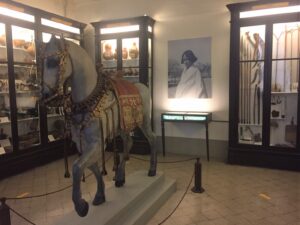This KNIR Dialogue, after briefly illustrating the Italian museum scene in its complexity, will focus on a few examples of museums and collections that bear witness to the continuities and fractures between liberal and fascist colonialism and how they were reflected in the organisation of colonial specimens and objects on display. The Museum of Anthropology in Florence, founded by Paolo Mantegazza in 1869, will be analysed as the museum housing the most important Eritrean collection from the liberal era and as a reference point for knowledge of the region at the time. The Museo Coloniale Maria Fioroni in Legnago, on the other hand, will be studied as a typical example of a museum from the Fascist and Imperial era (and its particularity as a museum run by a woman will be emphasised). As a point of contact and transition between the two, the 1914 Colonial Exhibition of Genoa will be addressed, as the event from which, in 1923, the Colonial Museum of Rome was born.
Finally, building on the controversial announcement of the rearrangement of the former Colonial Museum in Rome with the new name “Museo Italo-Africano Ilaria Alpi”, an attempt will be made to frame the Italian case in the broader ongoing debate on restitutions, redefinitions and rethinkings of colonial collections.
About the speaker
Beatrice Falcucci has earned a PhD in History of Science at the University of Florence, undertaking research about the colonial collections in Italian museums. Currently she is a member of the Fondazione Luigi Einaudi Torino and an Italian Fellow at the American Academy in Rome. She has published Il Museo Coloniale di Roma tra propaganda imperiale, oblio e riallestimento, in “Passato e Presente”, 2021, 112, pp. 83-99, Bringing the Empire to the provinces: colonial museums and colonial knowledge in Fascist Italy in “Cahiers François Viète”, 2021, 11(3), pp.113-146 and has co-edited “Affrica all’acqua di rose. I diari delle missioni in cirenaica del 1928-1929” of Nello Puccioni (Polistampa, 2019).



